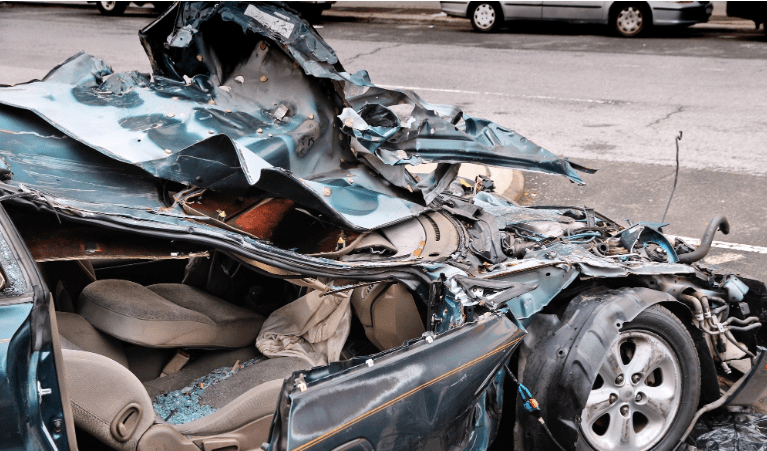When faced with the unfortunate situation of a severely damaged car, one of the primary concerns for the owner is understanding “how much does it cost to fix a totaled car?” This question becomes pivotal as individuals seek affordable solutions while ensuring the quality of repairs.
Reasons for Total Loss
The causes of a car being declared a total loss can vary, including accidents involving side, front, and rear collisions, resulting in damage to the main structure and mechanical components. The cost of repair depends on the extent and severity of the damages.
how much does it cost to fix a totaled car in houston tx?
In Houston, TX, understanding the cost of repairing a totaled car involves various factors. Insurance companies play a pivotal role in determining whether a car is deemed a total loss, considering the repair cost versus the vehicle’s cash value. If the repair expenses surpass a certain percentage, the car may be declared totaled. It’s crucial to assess the salvage value, as it influences the viability of repairs, especially when sentimental value is involved. Having comprehensive car insurance, including gap coverage, is beneficial in covering the disparity between the car’s value and outstanding loan. When navigating the process, obtaining estimates from reputable body shops in Houston is essential. Ultimately, being well-informed about the total loss criteria, insurance implications, and repair options empowers car owners to make informed decisions aligned with their preferences and financial circumstances.
Factors Influencing Repair Costs for Total Loss
Decoding the Costs of Totaled Cars: Unveiling the Factors Influencing Repair Expenses
When a car is deemed totaled, determining the feasibility of repairs and the associated costs can be a complex and daunting task. Numerous factors contribute to the final repair estimate, making it crucial for vehicle owners to understand these elements to make informed decisions.
1. Severity of Damage: The Prime Determinant
The extent of damage sustained by the vehicle stands as the primary driver of repair costs. Vehicles with extensive damage, such as structural compromises, frame distortions, or multiple component failures, will inevitably incur significantly higher repair expenses. Conversely, vehicles with minor damage, limited to cosmetic repairs or single-component replacements, will generally have lower repair costs.
2. Vehicle Type and Age: Shaping Repair Expectations
The type of vehicle and its age play a substantial role in influencing repair expenses. Luxury vehicles, known for their intricate designs, expensive components, and specialized labor requirements, typically demand higher repair costs. Additionally, older vehicles may necessitate sourcing outdated or discontinued parts, leading to increased procurement and replacement costs.
3. Labor Costs: The Hands-on Factor
Labor costs associated with repairing a totaled car can vary depending on the repair’s complexity, the hourly rates charged by the repair shop, and the geographical location. Specialized labor, such as that required for bodywork or engine repairs, will generally command higher rates than standard repairs.
4. Parts Replacement: The Costly Components
The cost of replacement parts significantly impacts overall repair expenses. Original equipment manufacturer (OEM) parts are typically more expensive than aftermarket parts, but they may offer superior quality and durability. The availability of parts and the need for custom fabrication can also influence part costs.
5. Insurance Coverage and Deductibles: Navigating Financial Implications
Insurance coverage and deductible amounts play a crucial role in determining the out-of-pocket expenses for the vehicle owner. Comprehensive and collision insurance policies may cover the repair costs, but deductibles, which represent the amount the policyholder must pay before insurance coverage kicks in, can vary significantly and impact the owner’s financial burden.
6. Repair Shop Selection: Expertise and Quality Matters
The choice of repair shop can also influence repair costs. Reputable repair shops with experienced technicians and a proven track record may charge higher rates but often provide higher quality workmanship and warranty coverage. On the other hand, less expensive repair shops may compromise on quality or lack expertise in handling complex repairs.
7. Geographic Location: Cost Variations Across Regions
Repair costs can vary considerably based on the geographical location of the repair shop. Urban areas with higher labor costs and living expenses may result in higher repair estimates compared to rural areas with lower costs.
8. Salvage Value: Potential Cost Reductions
In some cases, the salvage value of the totaled car may be factored into the repair cost equation. Salvage value represents the amount the vehicle is worth as a source of parts or scrap metal. If the salvage value is significant, it may reduce the overall repair expenses.
Navigating the Complexities: Seeking Expert Guidance
Given the interplay of these factors and the complexities involved in assessing total car repair costs, it is highly recommended that vehicle owners seek expert guidance from experienced mechanics and insurance professionals. These experts can provide comprehensive evaluations, accurate repair estimates, and valuable insights into insurance claims and salvage options, empowering vehicle owners to make informed decisions and navigate the complexities of totaled car repair.
how much does it cost to fix a totaled car in houston TX call us at (713)243-3535

Tips for Smart Price Negotiation for how much does it cost to fix a totaled car
When a beloved car meets an unfortunate end and is declared totaled, the aftermath can be both emotionally and financially challenging. Navigating the complexities of insurance claims and repair costs can be overwhelming, especially when faced with the prospect of negotiating a fair settlement.
However, by arming yourself with the right knowledge and strategies, you can effectively advocate for your interests and secure reasonable compensation for your totaled vehicle.
1. Lay the Foundation: Knowledge is Power
Before embarking on the negotiation process, it’s crucial to establish a solid foundation of knowledge. Familiarize yourself with the fair market value of your car by utilizing online resources like Kelley Blue Book or Edmunds. Carefully consider any additional features or options that your vehicle possessed, as these can significantly impact its value. Gather all relevant documentation, including the insurance policy, accident report, and any repair estimates. This arsenal of information will empower you to negotiate from a position of strength.
2. Embracing Negotiation: Be Confident and Prepared
Resist the temptation to accept the initial offer presented by your insurance company. Approach the negotiation with confidence and a willingness to engage in constructive dialogue. Formulate a counteroffer that aligns with your research and expectations. Maintain a professional and courteous demeanor while asserting your position firmly.
3. Documentation: Your Shield Against Uncertainty
Meticulously document every aspect of the process. Keep copies of all communications with your insurance company, repair estimates, and any supporting documentation. This meticulous record-keeping will serve as a valuable resource if disputes arise and will protect your interests.
4. Professional Guidance: Seeking Expertise When Needed
If the intricacies of negotiation seem daunting, consider seeking assistance from a professional negotiator. This strategic move can be particularly beneficial for high-value vehicles or when uncertainties cloud your decision-making.
5. Patience: A Virtue in Negotiation
Avoid succumbing to pressure or rushing into a hasty decision. Take the time to thoroughly evaluate your options and gather multiple repair estimates from reputable sources. Compare these estimates to the insurance company’s offer and carefully consider your negotiating strategy.
6. Know Your Rights: Understanding Policyholder Privileges
Familiarize yourself with the rights and protections afforded to you as an insurance policyholder. Understanding your legal standing will empower you to navigate the negotiation process with confidence and ensure a fair outcome.
7. Walking Away: A Last Resort
If negotiations reach an impasse and a mutually agreeable settlement remains elusive, don’t hesitate to walk away. Filing a complaint with the state insurance department is always an option if you believe your rights have been compromised.
The Ultimate Guide to Large Dent Repair Costs: A Comprehensive Breakdown
Additional Negotiation Strategies for Enhanced Success for “how much does it cost to fix a totaled car”
Aim High: Start with an ambitious counteroffer, leaving room for negotiation.
Seek Compromise: Strive for a mutually beneficial agreement, even if it means conceding on certain points.
Exercise Patience: Negotiation can be a protracted process; maintain composure and don’t relent prematurely.
Secure Written Confirmation: Document the final agreement in writing to avoid future disputes.
Remember, effective negotiation is a delicate balance of assertiveness, flexibility, and thorough preparation. By following these strategies and exercising patience, you can navigate the negotiation process with confidence and secure a fair settlement for your totaled vehicle.
When determining the cost of repairing a totaled car, insurance companies consider several factors, including the car’s make, model, and year. This is because different makes and models of cars have different costs for parts and labor.
Cost of parts: The cost of parts can vary significantly depending on the make and model of the car. For example, parts for luxury cars are typically more expensive than parts for economy cars. This is because luxury cars are often made with more expensive materials and have more complex designs.
Labor costs: Labor costs can also vary depending on the make and model of the car. This is because some cars are more difficult to repair than others. For example, cars with complex bodywork or engine designs may require more specialized labor, which can drive up the cost of repairs.
Availability of parts: The availability of parts can also affect the cost of repairs. If parts are rare or difficult to find, this can drive up the cost of repairs. This is especially true for older or discontinued models of cars.
In general, cars that are more expensive to repair are more likely to be totaled by insurance companies. This is because the cost of repairs may exceed the car’s value. However, it is important to note that the car’s make and model is not the only factor that insurance companies consider when determining whether to total a car. Other factors, such as the extent of the damage, the car’s age, and the car’s mileage, are also taken into account.
Here are some additional factors that can affect on “how much does it cost to fix a totaled car”
- The severity of the damage: The more severe the damage, the more expensive it will be to repair the car. This is because more extensive damage will likely require more parts and labor.
- The car’s age: Older cars are more likely to be totaled than newer cars. This is because older cars may have more rust and wear and tear, which can make them more difficult and expensive to repair.
- The car’s mileage: Cars with high mileage are also more likely to be totaled than cars with low mileage. This is because cars with high mileage may have more mechanical problems, which can make them more expensive to repair.
If you are involved in an accident and your car is totaled, it is important to get multiple estimates from different repair shops before you make a decision about whether to repair or replace your car. You should also compare the estimates to the insurance company’s offer to make sure you are getting a fair deal.

Insurance and Repair Costs
In many cases, insurance covers a substantial portion of the repair costs for a totaled car. However, there might be a need to bear some expenses out of the owner’s pocket.
Exploring the Best Estimates for “how much does it cost to fix a totaled car”
When searching for the best estimate to repair your car, consider the following steps:
1. Reviews and Ratings
Read user reviews and ratings online for potential repair shops. This step can provide insight into the quality of service offered.
2. Price Comparisons
Don’t hesitate to request estimates from multiple workshops and compare them based on the services provided and the overall cost.
3. Negotiation
Negotiate prices and payment terms intelligently. Smart negotiation may lead to a better deal.
contact us for how much does it cost to fix a totaled car
At Westside Collision Center, your trusted partner for automotive excellence, contact us to get a precise estimate on repairing your totaled car. Our expert team is ready to provide transparent insights into the cost and process, ensuring quality service tailored to your needs. Reach out today for a seamless collision repair experience.
Conclusion for how much does it cost to fix a totaled car
In conclusion, choosing a repair shop that offers high-quality repairs at a reasonable cost is a wise decision. Owners should carefully research to find the best estimate that meets their needs in the most efficient way possible.





